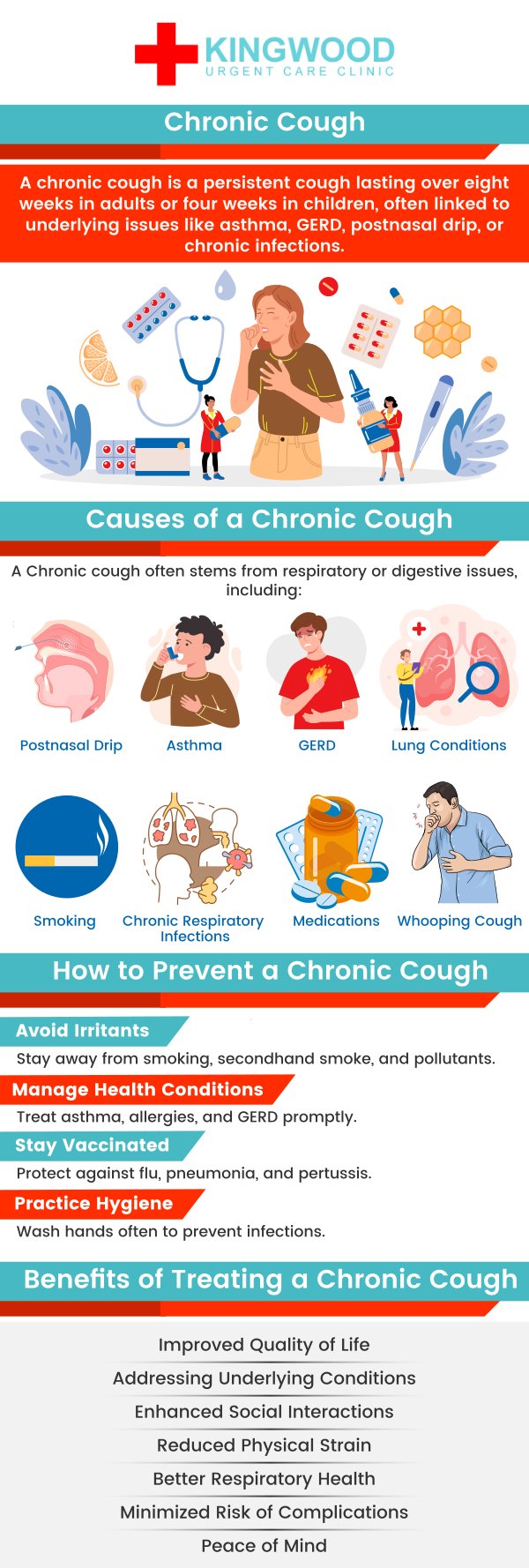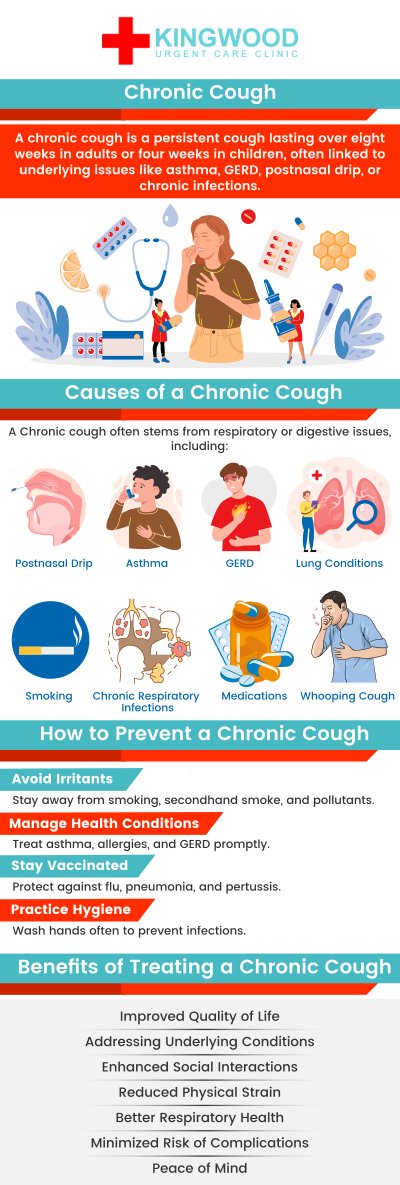Cough Treatment Doctor in Kingwood, TX
If you’re experiencing a cough that is painful, sore, or causing you discomfort, the medical team at Kingwood Urgent Care can help. We offer safe, professional, and efficient care so that you can get back on the road to good health as soon as possible. For more information about our services, contact us today or visit us online to see our business hours. We accept walk-ins and would be happy to answer any questions that you may have so you can feel confident moving forward with your treatment. Our clinic is conveniently located at 2601 W Lake Houston Pkwy Kingwood, TX.




Table of Contents:
What are the different types of cough?
How long do coughs last?
How do I know if my cough is serious?
How do you treat a cough?
When an irritant enters your upper or lower airways, a cough is your body’s natural way of expelling it. While a cough can be persistent and an unwelcomed occurrence for many, it’s important to remember that this is a protective mechanism that allows your body to recover and heal.
A persistent cough is a common symptom of quite a few different illnesses, which is why it’s important to get your cough assessed by a medical professional if it doesn’t go away after 10-14 days of home care.
Coughs are one of the most common medical symptoms as they’re associated with a plethora of conditions, ailments, and diseases. Different types of coughs can be identified by how long they last, when they occur, and how they feel or sound. It’s important to note that you may experience more than one type of cough at the same time.
The following are the different categories that coughing can be separated into:
– Acute. This type of cough begins suddenly and lasts on average, 2-3 weeks.
– Subacute. This type of cough sticks around after experiencing an infection and lasts 3-8 weeks.
– Chronic. If your cough lasts for longer than eight weeks, you likely have a chronic/persistent cough.
– Refractory. When you have a chronic cough that hasn’t responded to treatment, it’s noted as being refractory.
– Productive. Also known as a wet cough, this type of cough brings up mucus or phlegm.
– Non-productive. Also known as a dry cough, there is no mucus or phlegm present.
– Whooping. Also known as Pertussis, this cough is the result of an infection and causes a distinctive “whoop” sound when expelled.
– Barking. This type of cough is identified by it’s distinctive barking sound which can often be a sign of croup.
– Wheezing. When you have blocked airways that cause you to struggle to catch your breath, you may develop this type of cough. It may be indicative of an infection or chronic condition such as asthma.
– Daytime. When you cough worsens during the day, it’s considered a daytime cough.
– Nocturnal. If your cough worsens during the night time, it’s considered to be a nocturnal cough.
The longevity of your cough depends on what’s causing it, any coinciding health conditions, the self-care measures you’re taking, and the strength of your immune system. On average, a cough typically lasts between 10 and 14 days and it’s often the last symptom to go away.
If you’re experiencing a cough that has lasted longer than two weeks without improvement you should schedule in to see your primary physician or a medical practitioner.
While a cough will go away on its own with time, rest, and proper care, there are times when a cough should be evaluated by a healthcare provider. This is especially true if you’re suffering from a chronic condition in addition to a cough as you’ll likely require very specific medical advice and treatment.
In general, you should call your healthcare provider if you (1) have a cough that isn’t going away and (2) any of these symptoms are present:
– A fever that has lasted more than two days.
– Chills.
– Fever over 101.5 F.
– Wheezing
– Yellow, green, or bloody phlegm.
There are also certain situations where a cough warrants you going to the emergency room or calling 911. These include:
– Feeling like you’re choking.
– If you have severe chest pain.
– If you’re seeing blood when you cough.
– If you’re struggling to breathe.
How you treat a cough will vary depending on what’s causing the cough. While an infection will likely require antibiotics prescribed by your doctor, a viral cough can often be treated using at-home care methods. These include:
– Avoiding irritants such as cigarette smoke, dust, hairsprays, etc.
– Drinking plenty of fluids, including water, tea, and broth.
– Drinking warm beverages with honey.
– Sucking on cough drops or hard candies.
– Taking a warm bath or shower to help clear your airways.
– Taking over-the-counter medications such as decongestants or antihistamines.
– Using a humidifier to add extra moisture into the air.
If your worried about your cough and would like help addressing it, visit us at Kingwood Urgent Care. We offer comprehensive and professional care to help you safely navigate the underlying cause of your cough. For more information, or to ask any questions, contact us today – our team of dedicated specialists would be happy to assist! We serve patients from Kingwood TX, Huffman TX, Atascocita TX, Humble TX, Porter TX, New Caney TX, Houston TX, Crosby TX, Dayton TX, Mont Belvieu TX, and Spring TX.






